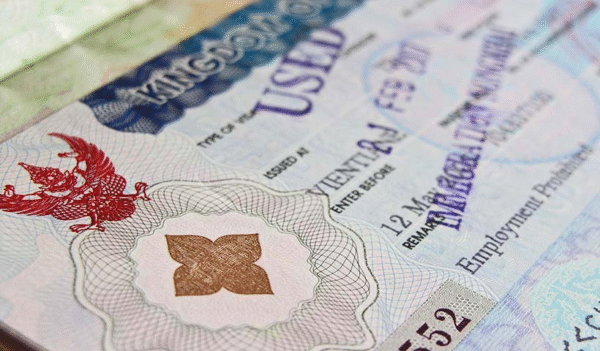Thailand immigration continues to attract people from all over the world, whether for a short tropical escape or a long-term move. The country's unique charm appeals to tourists, expats, digital nomads, and retirees, from white sand beaches and vibrant street markets to lush jungles and ancient temples.
There are different visa options available that offer flexible paths for different needs and lifestyles. However, the process is influenced by your nationality and the purpose of your travel. Knowing your options is very important for a stress-free move. Here, we'll discuss the key visa categories, requirements, and tips for navigating the Thailand immigration system successfully. Let's take a closer look!
Thailand Entry Requirements
The Thai government has some rules for foreign residents who come to the country. Thailand's visa restrictions vary based on your nationality. Based on your details, the Thai e-visa website may determine whether you must have a tourist visa, what kind of visa you require, and whether you can apply online. The following guidelines apply to various nationalities:
- Visitors from the United States, Canada, New Zealand, Malaysia, Japan, South Africa, and Singapore can enter Thailand and remain without a visa for 30 days.
- There is a 90-day stay limit for visitors from Brazil, Chile, Argentina, South Korea, and Peru.
- Visitors from Macau, Hong Kong, Laos, Russia, Mongolia, and Vietnam can stay for thirty days.
- Cambodian and Myanmar tourists can stay for 14 days if they enter at any international port.
- Visitors from 17 countries, including India, Mexico, and China, can apply for a 15-day visa on arrival.
EU/EFTA nationals are granted a 30-day visa-free stay in Thailand. A tourist visa is required for stays of up to 60 days. You must get a long-term visa to stay longer than 60 days. So, anyone planning to move to Thailand needs a long-term visa, depending on the reason for relocating.
Types of Visas Required for Thailand Immigration

You can enter Thailand using any of several different types of visas. If you want to stay for an extended period, here are the visas you'll need as a foreign national for Thailand immigration:
1. Non-Immigrant Visa (Type O-A)
The O-A Visa is for foreigners who plan to retire in Thailand or stay for a long time. This visa is only available to retirees over the age of 50. You must provide a valid passport, a police clearance, a medical certificate, and evidence of your financial stability. Also, you must not be working at a foreign company. You must apply in person at the Thai embassy or consulate in your country of residence. This visa is valid for one year, although you can extend or renew it once in Thailand.
2. Non-Immigrant Visa (Type B)
Foreign travelers visiting Thailand for work, investment, or business-related reasons must apply for a Non-immigrant B Visa. You are qualified for this visa if you want to work or conduct business while you are in Thailand. To apply, you'll need a valid passport, a visa application form, a corporate letter or business documentation, and proof of financial resources to fund your stay in the nation. You can apply for this visa in person at any Thai embassy or consulate. After you get to Thailand, you can extend the first 90-day validity period. You can learn more about the Thai work visa and application process here.
3. Education Visa (ED Visa)
Thailand immigration is popular for study purposes. The Education Visa (a student visa) is for foreign visitors who want to study or take courses in Thailand. Enrollment in an educational program in Thailand is a must for eligibility.
This visa requires proof of enrollment, an admission letter, and financial proof that you can afford the cost of tuition and your entire stay in the country. This visa requires an in-person application at a Thai embassy or consulate. After your 90-day visa expires, you can apply for an extension to stay in Thailand for the length of your academic program.
4. Thai Elite Visa
The Thai Elite Visa is for third-country nationals wishing to stay long enough to meet specified financial conditions. Those who have this visa are eligible for specific privileges. To apply, you must present a valid passport and financial proof and pay the application fee.
You can apply for this Thai elite visa online or in person at any Thai embassy or consulate. Several membership packages are available, each with a distinct cost and validity period. These plans range from 600,000 baht (17,000 USD) for five years to 2.5 million baht (70,000 USD) for twenty years.
5. Non-Immigrant Visa “O”
Thailand immigration is popular for family reunification purposes. You may apply for a Thai Non-Immigrant O visa if you wish to travel to the country for a prolonged stay to see family members. Some people also call it the marriage visa. Additionally, the Non-Immigrant O visa covers a few other specific instances, such as individuals who require medical treatment for more than 60 days or want to work in Thailand for an NGO without compensation.
Documents Required for Visa Application
Here are the documents you'll need for your long-term resident (LTR) visa application:
- Application form
- Current visa
- A valid passport
- Passport photographs
- Proof of accommodation
- Proof of visa fee payment
- Proof of sufficient financial funds (Bank statements, etc)
- Letter of invitation (If you're visiting a relative)
- Proof of employment
- Travel insurance
- Police certificate
- Health certificate
Please be aware that the requirements for each type of visa are different depending on your nationality, where you are applying, and the reason for your visit. Please never hesitate to contact the Thai Embassy or Consulate for more information.
How to Apply
The procedures for applying for a Thailand visa vary depending on the type of visa and your nationality. However, there are several basic steps to the process. Here is how to go about the visa application process:
1. Determine The Type of Visa You Need
Determine the reason for your travel to Thailand and look into the various Thai visa options. Find the best visa for your purpose of visit, which can range from vacation to education to retirement. Also, check the eligibility criteria and detailed requirements for the Thai visa you intend to obtain.
2. Fill the Visa Application Form
Go to the official embassy or consulate's website and download the visa application form. Complete this form by providing accurate and comprehensive information. It will ask you some questions about your travel itinerary, personal information, and the reason for your trip. You should fill out all the necessary information and confirm that it is correct by checking it twice.
3. Gather Your Documents
The required documentation will differ depending on the type of visa and your nationality. Ensure that your documents are in the order the Thai embassy or consulate requests.
4. Schedule an Appointment
The appointment process will differ depending on which embassy or consulate you're applying to. You might have to make an appointment in advance, show up during certain walk-in hours, or be free to come whenever you want to complete your visa application. For information on the visa application procedure, contact the embassy or consulate where you are applying.
5. Submit the Application
Bring your supporting documentation to the embassy or consulate to apply for a Thailand visa. For this, make sure that all of your documentation is in order. It could be a mail or online application at certain embassies or consulates; check to see what steps you need to take.
Your nationality and the kind of visa you're seeking will determine whether you need to provide biometric data, such as your fingerprints. If you are required to do this, adhere to the instructions provided by the Thai embassy or consulate. Ensure to ask the immigration officer any further questions.
6. Pay the Visa Fee
Make the necessary visa payment. The fee will change depending on the kind of visa you need and how long you plan to stay. Contact the local Thai embassy or consulate for information on the accepted payment methods.
7. Get Your Visa
You will be noted of the visa decision as soon as it has been processed. You can pick up your passport from your local embassy or consulate using the attached visa. If you also have questions, ask the officers in the immigration office. Before leaving, ensure to confirm the details on your visa, including your name, passport number, and validity dates.
Processing Time
Your nationality, the type of visa you are looking for, and the particular embassy or consulate where you apply can all affect how long it takes to process your application for a Thailand visa.
- A non-immigrant visa (Type B) takes about 5 to 10 weeks to process. Note that there is also a 90-day non-immigrant B visa for those who don't want to stay long in the country.
- Non-Immigrant visa (Type O-A) takes about 2 to 4 weeks to process.
- An ED visa takes about 2 to 5 weeks to process.
- The Thai elite visa takes several weeks after the visa application.
It is essential to note that these are only estimates, and processing timeframes for Thai immigration may differ. Many circumstances can cause your visa to be delayed, such as not completing all areas of the requirements or the need to authenticate or confirm facts in your application.
Visa Fees
- Non-Immigrant visa (Type O) costs $80.
- Non-Immigrant visa (Type O-A) costs $80 and $200 for retirement.
- Non-Immigrant visa (Type B) costs $80
Visa for Remote Workers and Digital Nomads
Thailand has a wide range of choices for digital nomads, who are known to travel and operate remotely from different locations. Many digital nomads like to visit exciting places, including Chiang Mai, Bangkok, Krabi, Phuket, and Koh Samui. Due to their frequent travels, many digital nomads believe that tourist visas are adequate for immigration. If not, high-earning remote workers might be eligible for the LTR visa program as work-from-Thailand professionals, and nomads over 50 might consider applying for an O-X or O-A non-immigrant visa.
Conclusion
Thailand's welcoming atmosphere and flexible visa options make it an ideal destination for travelers and long-term residents. By understanding Thailand immigration process and choosing the right visa, you can enjoy everything the country offers with confidence and ease. Plan ahead, stay informed, and embrace your journey in Thailand.
















